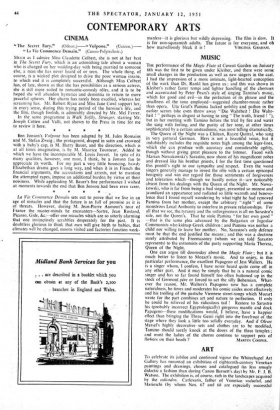CONTEMPORARY ARTS
CINEMA
"The Secret Fury." (Odeon.)—"Volpone." (Curzon.)— "Li Vie Commence Demain." (Cameo-Polytechnic.)
MUCH as I admire Miss Claudette Colbert, she is not at her best in The Secret Fury, which is an astonishing tale about a woman who is charged on her wedding-day with being married to someone else, a man she has never heard of or seen. The whole thing, of course, is a wicked plot designed to drive the poor woman insane, to which end it is completely successful. Although Miss Colbert has, of late, shown us that she has possibilities as a serious actress, she is still more suited to romantic-comedy roles, and it is to be hoped she will abandon hysterics and dementia to return to more peaceful spheres. Her charm has rarely been excelled, whereas her screaming has. Mr. Robert Ryan and Miss Jane Cowl support her, in every sense, during this trying period of the heroine's life, and the film, though foolish, is admirably directed by Mr. Mel Ferrer.
In the same programme is Walk Softly, Stranger. starring Mr. Joseph Cotten and Valli, not shown to the Press in time for me to review it here.
Ben Jonson's Volpone has been adapted by M. Jules Romains and M. Stefan Zweig; the protagonist, draped in satin and crowned with a baby's cap, is M. Harry Bauer, and the direction, which is at all times imaginative, is by M. Maurice Tourneur. Added to which we have the incomparable M. Louis Jouvet. In spite of its many qualities, however, one must, I think, be a Jonson fan to appreciate its worth. For my part a very little bouncing, bawdy Elizabethan drama goes a long way, and when it is in French the financial arguments, the accusations and arrests, not to mention the attempted rapes, impose an additional burden by virtue ot their noisiness. While applauding M. Bauer's fine performance I wished at moments towards the end that Ben Jonson.had been even rarer.
La Vie Commence Demain sets out to prove that we live in an age of miracles and that the future is as full of promise as it is of threats. However, during M. Jean-Pierre Aumont's tour of France the master-minds he encounters—Sartre, Jean Rostand, Picasso, Gide, &c.--offer one miracles which are so utterly alarming that one instinctively scrabbles desperately for the past. It is doubtless glorious to think that men will give birth to babies, that climates will be changed, moons visited and factories function work- manless—it is glorious but wildly depressing. The film is slow. It is for non-squeamish adults. The future is for everyone, and oh


































 Previous page
Previous page